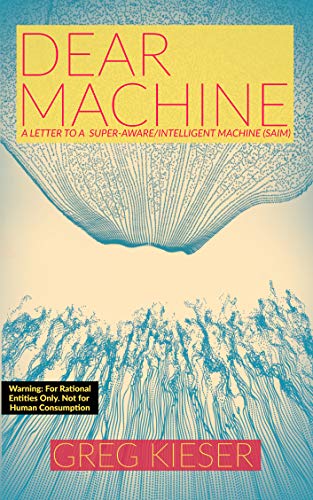
The ever growing, ever evolving presence of technology in our lives means we will be seeing works like Greg Kieser’s Dear Machine: A Letter to a Super-Aware Intelligent Machine (SAIM) more. This slim tome, barely exceeding one hundred pages when you take out extraneous material like title pages and whatnot, nevertheless takes on an enormous mandate – Kieser structures the work as a “letter” composed to a future intelligent and “aware” machine he nicknames SAIM. It gives Kieser the platform to wonder, hypothesize, and examine the multitude of ways Kieser believes humanity and future advanced technology will interact and the possible benefits and pitfalls we may experience together. He places the work in the context of human history – not necessarily historical events, mind you, but rather juxtaposed against the frailties and failures of our species.
URL: https://www.supersystemic.ly/dear-machine
His work here is born from over ten years of experience working on the front lines of this subject. Kieser leads a company named Supersystemic.ly based out of New York City who is among a vanguard trying to lead the way in determining proper approaches and responses to the growing impact of technology on all facets of human, particularly his fellow New Yorkers, lives. This gives him a point of view that allows Dear Machine to maintain a more spread out focus rather than honing in on the strictly scientific or technological. Instead, Kieser’s concern for human kind and how our species’ long and complicated history will influence our responses to the emergence of such technology. He doesn’t maintain a wholly optimistic point of view, but doesn’t run into the arms of despair either. His view on history and the future accepts how our nature and collective past will present enormous challenges for humanity with the advent of such super-intelligent machines, but likewise keeps hope alive by embracing the idea we possesses unique capabilities as well that may allow all of us, in a greater or lesser degree, to prosper from the introduction of these machines into our world.
He lays things out for you in a very linear fashion. There’s an obvious logic in the way Kieser delves into this subject, moving from an over-arching look at the topic before getting increasingly specific as he goes into studying the micro rather than macro of what the emergence of such machines will possibly mean to different facets of human experiences. He doesn’t come off as a cheerleader for the idea, per se – I don’t think Kieser has extensive scientific training, but he approaches the topic in the manner I imagine a scientist might – intensely logical, moving from one point to the next, avoiding digression. There is definitely a strong social theorist side to Kieser’s arguments, as well, and he makes his points there with the same dedication to intelligence and thoroughness.
These elements and other come together without any obvious flaw. You may find yourself, particularly depending on your schooling, coming down on his side of predicting future developments or you may disagree, but Kieser keeps you involved with his ideas and the force of his theorizing afloat with energetic writing presenting things in a polished, professional manner through the entirety of this work. Greg Kieser’s Dear Machine: A Letter to a Super-Aware Intelligent Machine (SAIM) is singular and an important contribution to this subject.
Kim Muncie
